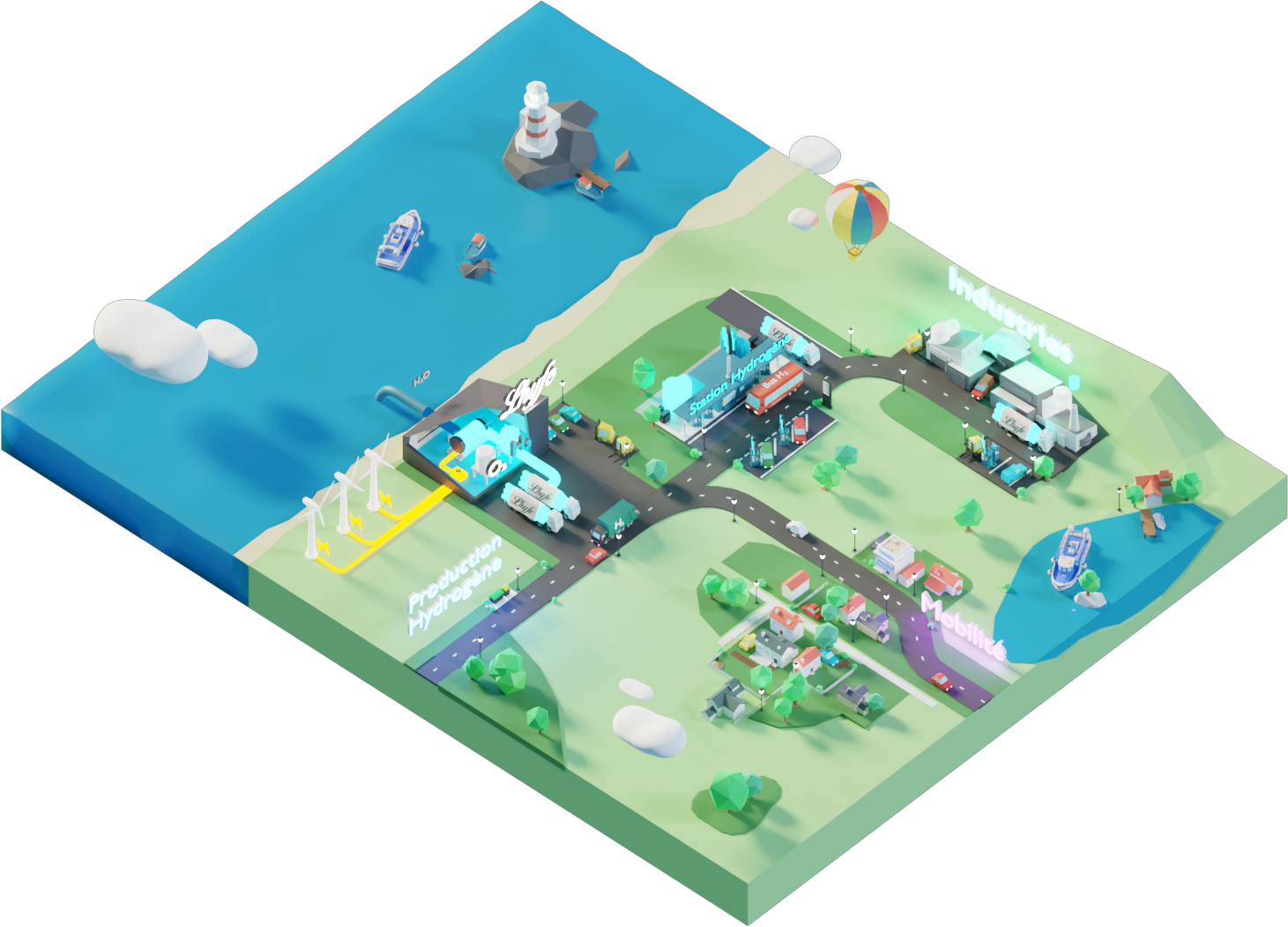
Nantes–On Thursday the 10th of April current partners of the VHyGO consortium coordinated by Lhyfe announced that their project is one of the 7 winners of ADEME – for its first phase that was tabled in December 2020 – as part of the hydrogen territorial ecosystem project call.
This superregional project aims to produce renewable hydrogen that is accessible to all and to reduce the territory’s carbon footprint by avoiding 50,000 tonnes of CO2 by 2024. The other two phases of the project are and will be the subject of projects filed in March and September 2021, which will be joined by communities and industrialists who also wish to contribute to the deployment of renewable hydrogen in the Greater West regions of France.
Driven by a conviction “Hydrogen must not be the source of an ecological divide between large and small” (communities and businesses), the consortium has set the following objectives:
- Develop the production of renewable hydrogen;
- Support the transition to zero-emission urban, intercity and maritime mobility by enabling communities and businesses to buy vehicles at the best price;
- Integrating renewable hydrogen into industrial uses;
- Create coherent ecosystems that address the environmental challenges of local authorities and businesses.
In synthesis, democratize renewable hydrogen and ensure that every business, every community in the Greater West iswithin100 km of a renewable hydrogen production site available at less than 8 degrees per kg at the pump by 2030.

VHyGO’s main objective is the democratization of renewable hydrogen. To this end, the consortium proposes to the territories a strategy to:
- Lowering the cost of hydrogen through larger shared production sites,
- Making hydrogen available everywhere and for everyone which means being able to deliver hydrogen and have gas stations,
- Lower the cost of vehicles by grouping
The territory already has two funded projects: EffiH2 (service station with electrolysis in Vannes) and H2Ouest (a production site in Bouin, 3 petrol stations in Vendée, one in Le Mans, 12 buses, 11 household dumpsters, 2 HGVs and several light commercial vehicles).
The goal for 2024 is to achieve:
- production of at least 5 tonnes of renewable hydrogen per day, distributed at 10 sites (with the capacity to reach 10t tonnes per day by 2027)
- a minimum of 20 hydrogen dual-pressure service stations that will run the 3 regions,
- 500 hydrogen vehicles that will fill up
This change in scale will lower the cost of investment and the cost of hydrogen, and allow hydrogen technology to compete with its thermal equivalents. Price targets are:
- a renewable hydrogen cost at the pump of less than 8 cent€/kg in 2030 and reaching 9 cents/kg H2 from 2023;
- an attractive price for vehicles vis-à-vis diesel solutions.
A 3-phase project to gradually ramp up with new partners
In order to make the VHyGO project a reality and make it operational in 2024, the consortium opted to
A three-phase approach to take into account the specific timetables of each stakeholder, corresponding to the following deadlines: December 2020, March and September 2021.
The first phase of the VHyGO project includes:
• 3 new sites for the production of green hydrogen by electrolysis. This semi-centralised production with a capacity of 3.5 MW will be distributed among the three regions of the project: Brest (1.5 MW), Saint-Nazaire (1.5 MW) and Dieppe (0.5 MW).
• 3 new distribution stations. These stations will be located as close as possible to the uses and will constitute a first mesh of the territory. With an initial capacity of 1900kg/day in total,they will be flexible to accompany the planned ramp-up throughout the various phases of the project.
• 23 hydrogen buses 12m, 7 hydrogen garbage dumpsters, 1 hydrogen weight-heavy in retrofit, 10 light commercial vehicles and 30 hydrogen buses 18m (the latter will not be the subject of a funding application until September). These uses will bedivided between Brest Metropole, CARENE, and the Dieppe Maritime conurbation.
The VHyGO project currently has 10 phase 1 partners, with significant support from the Loire region, Brittany and Normandy. A dozen actors havealready committed to Phases 2 and 3, and other entities can still join the project until September 2021, when the 3rd and final file will be submitted to ADEME.
Tristan FOVEAU, Vice-President of Brest Metropolis, in charge of energy operators and sustainable waste management: “We have the ambition to support the emergence of a green hydrogen pipeline produced loca lement in Breton. The development of this clean and renewable energy vector can play a key role in energy and environmental transitions, particularly in the area of mobility. We are therefore particularly proud to be a involved inthe VHyGO project.”
Patrick Boulier, President of Dieppe Maritime: “Our agglomeration is historically a territory of energy and industry. By developing this sector of renewable hydrogen produced locally, Dieppe Maritime wishesto support the emergence of innovative solutions in order to respond today to the strong local, regional and national economic and environmental challenges. We are delighted to be part of such an ambitious consortium driven by strong convictions.”
Read the most up to date Fuel Cell and Hydrogen Industry news at FuelCellsWorks




